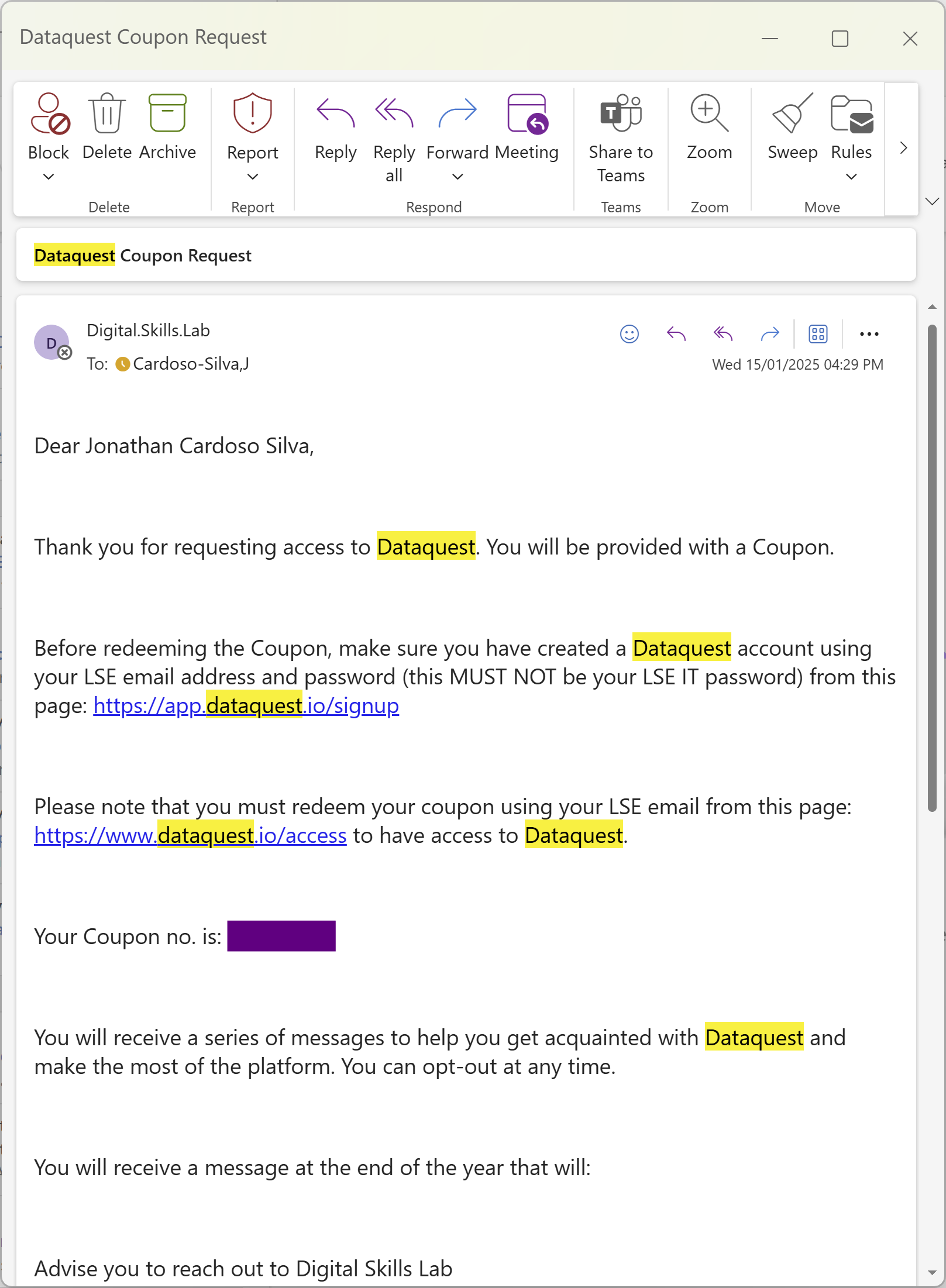📝 W01 Formative Exercise: Foundations for Python Programming

Coding is one of those things where practice makes perfect. In DS105W, we will ask you to work on coding exercises even before we had the chance to introduce you to the concepts in the lecture. This is so you come to class with questions, which is the best way to get the most out of our time together.
⏳ Duration
This exercise should take approximately 2-3 hours, depending on your familiarity with the tools and Python basics, and is the best way to get you ready for the Week 01 of DS105W.
Task 1: Joining and interacting on Slack
Slack will be our main communication hub for DS105W. Students consistently tell us it helps them connect with peers and get quick help with course questions.
🎯 ACTION POINTS
🗒️ NOTE: Whenever you see the 🎯 ACTION POINTS text, it means you have a set of tasks to complete. This will also be the case in the course materials.
- Join the DS105W Slack workspace using your LSE email address:
Visit our Slack group
New to Slack? Use this invitation link1.
Set up your profile with your preferred name and, if possible, a photo of yourself or at least a picture of something to remove the ‘generic avatar look’. It helps us connect names to faces, especially when following up on in-class discussions!
Read the pinned messages on each of the channels:
#announcements: Course updates#social: General discussion and peer interaction#help: Course-related questions- The group channel related to your Friday labs (
#class-group-X). Find it under More > Channels
IMPORTANT: Perform at least one interaction in the
#socialchannel to show us that you have understood how to use Slack messages.Here’s how to perform this task:
Click on the
#socialchannel.See if anyone from the same degree programme and year as you has introduced themselves.
Reply to their message. For instance:
“Same here. I am also a first-year BSc Economics student. DS105W will be my first coding course!”
If no one has introduced themselves yet, post your own introduction and wait for someone to reply 👀.
Task 2: Set up DataQuest and take Python lessons
DataQuest provides essential Python tutorials you’ll need before our first lab session. The LSE Digital Skills Lab (DSL) 2 has prepared a dedicated Moodle page with access instructions and curated lessons. Aim to complete these lessons before the Week 01 lecture.
🎯 ACTION POINTS
Complete these steps to access DataQuest and master the basics of Python:
Access the Python for Data Science Pre-sessional Course page on Moodle.
Read the box about the ‘Python Pre-sessional Workshops in WT’ – you might be interested in attending their in-person workshops as they might complement our course.
Fully read the section Getting Access and using DataQuest under that Moodle page to get your DataQuest voucher code.
Halfway through those steps, you will receive an e-mail with a coupon:

Figure 1. You will get an e-mail like this once you followed the instructions and fill out the form. Keep following the instructions to register for DataQuest Pro. Remember to use the voucher code you received via e-mail.
Now that you are fully set up with Dataquest, try to complete all the lessons listed under “Introduction to Python” on the pre-sessional Dataquest Moodle page before our first lecture on Thursday, 23 January.
For your convenience, here is a copy of the links to the lessons you need to complete:
- Programming in Python
- Programming Python Variables
- Python Data Types: Integers, Floats, Strings
- Python Lists
Try to keep separate notes on the key concepts you learn in these lessons. You will need them for the W01 Lab!
Prepare for Lecture and Lab
Take focused notes on:
- Variable creation and usage
- Core data types (integers, floats, strings)
- List operations (adding, removing, slicing)
You’ll need these concepts in the W01 Lab when we start working with Jupyter Notebooks. Choose any note-taking format that works for you—handwritten, digital, or markdown.
💡 TIP: Your DataQuest work sets the foundation for our hands-on Friday lab sessions. We will practice similar concepts but on a different environment.
Task 3: Set up your Nuvolos workspace
During your time in DS105W, you will write and run your own Python code in a cloud-based environment called Nuvolos. This platform will be our primary coding space for the course. We will also guide you on how to install Python on your personal computer later but for now, Nuvolos is the best way to get started.
🎯 ACTION POINTS
Follow our
 Nuvolos Guide - First Access to create your account.
Nuvolos Guide - First Access to create your account.⚠️ IMPORTANT: It is crucial that you follow those steps precisely to avoid common issues.
- Use an incognito/private browser window
- Mac users: Safari works best
- Check your spam folder for the confirmation email
💡 TIP: Setting up Nuvolos now ensures you’re ready for our first lab session. If you encounter issues, post them in the #help Slack channel with screenshots.
How This Exercise Prepares You for Week 01
Here’s how this exercise will help you in the first week of DS105W:
- In the W01 Lecture we will:
- Recap Python basics (variables, data types, lists) introduced in the DataQuest lessons.
- Expand on flow control (
if/else) and introduce collections (e.g., dictionaries). - Demonstrate Jupyter Notebooks as a key tool for this course.
- In the W01 Lab we will:
- Reinforce Python skills by creating a Jupyter Notebook in Nuvolos, which will serve as your primary space for notes and code samples.
- Focus on working with lists, dictionaries, and flow control in real-world scenarios.
Footnotes
The Slack link is private and only available on Moodle↩︎
Not to be confused with the LSE Data Science Institute (DSI)↩︎
